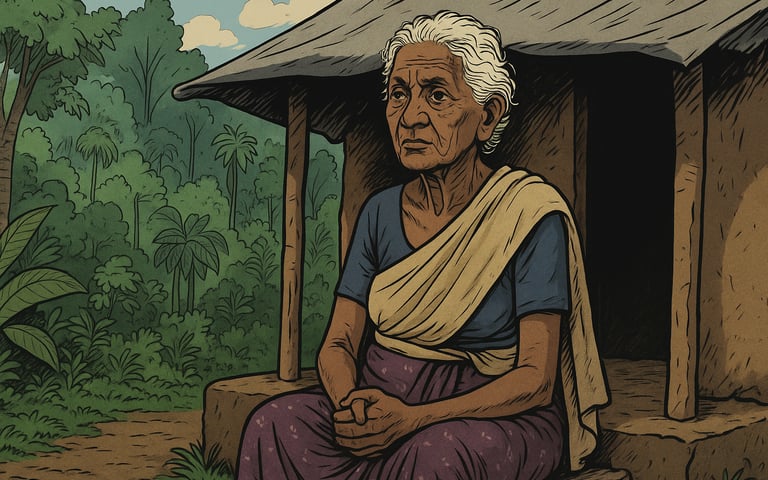Women living alone in Indian wilderness
7/3/2025


Nestled in the folds of the Western Ghats, far beyond mobile networks and concrete paths, lies Injikuzhi—a remote village near Karaiyar Dam in Tamil Nadu’s Tirunelveli district. Here, time doesn’t tick by in hours or minutes but drifts with clouds, rustles through leaves, and echoes in elephant trumpets.
And in this silent symphony of nature lives Kuttiyammal, a centenarian and the last woman residing in this untouched forest village.
Getting to Injikuzhi isn’t easy. From the Karaiyar Dam, the journey begins with a three-kilometre boat ride across shimmering waters, followed by a rugged jeep ride that climbs 18 kilometres into the hills. The final stretch—a three-kilometre walk through dense forest—takes you past pepper vines, coconut groves, and slippery slopes, finally arriving at the doorstep of a woman who lives in complete harmony with the wild.
Kuttiyammal sits quietly on the verandah of her tarpaulin-roofed hut, clad in a simple wraparound skirt and loose blouse. Her white hair is thick and unruly, her skin lined with stories. At over 100 years old, she has watched generations pass and forests change—but her soul remains deeply rooted in the soil she was born in.
“I don’t like the sound of humans,” she says with disarming honesty. “But I cannot live without the sound of elephants.”
Her words aren’t poetic metaphors—they’re her truth. Wildlife isn’t a threat here. It’s family. She collects firewood from nearby groves, drinks water from the pure Thamirabarani River which originates just five kilometres away, and eats jackfruits that drop ripe from the trees. Her meals are simple—plain rice with no gravy. Her needs are minimal, her desires even less.
An Unplugged Life in a Hyperconnected World
Kuttiyammal has never used a phone, nor does she own a television. “I know the time by watching the clouds,” she tells me. “I was here when the British came. I’ve lived long enough to see everything change. But I never wanted to leave.”
Her daughter passed away from a snakebite years ago. Her son visits occasionally, but she lives alone—by choice, not by circumstance. "I’ve never felt the need to leave this forest. My home is here, my peace is here."
Only two other families remain in Injikuzhi today. The rest have moved closer to Karaiyar and its facilities—schools, post offices, ration shops. But Kuttiyammal stayed behind, unbothered by development, untouched by modernity.
Forest Ranger Kalyani confirms that no one is forced to leave. “People moved down the hills over time. But Kuttiyammal refuses to go. We respect her decision.”
The Desire to Vote, the Power of a Voice
Ask her if there’s anything she wishes for, and she mentions her desire to vote. “I used to walk with my father to the polling booth. But I haven’t been able to vote for the past two years. My legs don’t let me go down. If officials make arrangements, I’ll be glad to vote again.”
Her words cut through. Even in isolation, she wants her voice to count.
Lessons from the Forest
Injikuzhi is more than a destination—it’s a revelation. As I prepared to leave, Kuttiyammal looked up and smiled. “If an elephant wants to kill me, it will. But if it dies, I will mourn like I’ve lost my kin.”
Her connection to the land and the animals is not romanticized—it’s real, raw, and rare.
In a world that moves fast, consumes more, and connects endlessly, Kuttiyammal reminds us that true connection doesn’t always need technology. It needs roots. Silence. Respect for nature. And above all, the courage to live life on your own terms.
Quick Links
Connect
Share
contact@palayamkottai.com
© 2025. All rights reserved.


